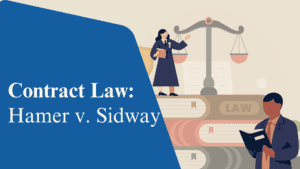
Key words: tort claim, tort definition, intentional tort, negligence, strict liability tort
1. Tort Definition
A tort is a wrongful act or omission that leads to injury of another and amounts to civil liability. The injured party typically will be compensated for damages in the form of money by the wrongdoer after a tort claim lawsuit.
In the United States, tort laws differ from state to state. In most states, however, many courts use the Restatement of Torts as an guide and four elements of a tort must be proven in a trial in order to establish civil liability.
hrough tort law will ask for damages in the form of monetary compensation. Less common remedies include injunction and restitution.
The four elements of torts include:
(1) Duty:
(2) Breach of the Duty
(3) Injury
(4) Proximate Cause
(1) Duty:
In tort laws, duty refers to everyone’s responsibility of respecting the rights of others and it generally includes the duties of not injuring another individual’s health, reputation, privacy and property rights. The boundaries of the duties are defined by common law, state statutory law and sometimes federal laws.
(2) Breach of the duty
At least one of the aforementioned duties need to be violated in order for a tort to be constituted. Generally, whether a breach of a tort duty exists is decided by a jury since it is a matter of facts.
(3) Injury
Most of the time, an injury must occurred in order for a tort to be constituted. A tort is not constituted if there is only a wrongful act but no injury happened.
(4) Proximate cause
Proximate cause refers to that it is reasonable to foresee that a breach of duty will result in an injury, and the violation of the duty did result in an injury.
2. Three categories of torts
Torts can be divided into three categories: (1) intentional torts, (2) negligent torts, and (3) strict liability torts
(1) Intentional torts
Intentional torts are the type of torts where injuries stem from intentional acts. The intent to injure another is required to constitute an intentional torts, and typically this intent will need to be proven at trial.
Examples of intentional torts cases: Battery, Assault, Defamation, Invasion of Privacy.
(2) Negligent torts
Negligent torts are the type of torts where injuries stem from negligent acts. This type of torts do not require the intent to injure another. Instead, negligence or carelessness as the cause of the injury is enough to constitute a negligent tort.
Examples of negligent torts cases: Medical malpractice, Car accidents.
(3) Strict liability torts
Strict liability torts are the type of torts where injuries stem from dangerous activities or defective consumer products. For strict liability torts cases, a person is liable for his or her actions regardless of the intent or mental state. Neither intent or negligence is required to constitute a strict liability tort. Strict liability only applies to those unusually dangerous activities.
Examples of strict liability torts cases: blasting, keeping dangerous animals
3. Tort claims and criminal liability
As a lot of people are confused by the differences between a tort and a crime, one principle to bear in mind is that a tort claim is a civil case and a wrongful act can be both a tort and a crime. For example, a drunk driver hit another car on the highway can be charged criminally with DUI, while also be sued civilly by the owner of the injured car for tort.
(1) What are the differences between a tort claim case and a criminal case?
First of all, a crime is defined as a public offense against society while a tort is a private wrongdoing injuring an individual. The government will prosecute the public offenses for the whole society but not the private wrongdoing for an individual. In other word, the government will represent you at court for your tort claim. Instead, you will need to file a lawsuit for your tort claim by yourself.
Secondly, for a criminal liability to be affirmed at a trial, the government prosecutor must prove that the charges against the offender are beyond a reasonable doubt. While a tort claim only needs to be proved by a preponderance of the evidence.
(2) Does acquittal from criminal liability also end the tort claim?
Unfortunately, an acquittal does not necessarily mean that a tort claim case is also dismissed.

Comments
Pingback: Strict Liability Tort - CovertProfession
Pingback: All you need to know about negligence tort- negligence definition and examples - CovertProfession
Author
Its really helpful! Thank you!